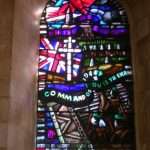Seventy years on
Seventy years ago today, my friend Archie set foot on a beach in northern France. He was 21 years old at the time. He was from Newtownards in Co Down and had volunteered to join the Royal Air Force three years previously. Archie trained as a radio operator, imagining that this would lead him to becoming the member of a bomber crew. However, the Canadian army were short of radio operators and Archie was transferred to serve with the First Canadian Army. Thus it was on 6th June 1944 that he found himself leaping into the water from an allied landing craft with a radio pack on his back and running onto the beach at Saint Aubin sur Mer. The beach had the code name “Juno”.
Archie avoided commemorations, he took the view that they didn’t capture the horror of the events. When books were published to mark the 60th anniversary of D-Day in 2004, there seemed to be many veterans who shared Archie’s opinion. Martin Bowman collected a series of reminiscences in his book “Remembering D-Day: Personal Histories of Everyday Heroes”. Bowman quoted from Donald Burgett, a member of the 101st Airborne Division who was nineteen years old when he landed in Normandy. Burgett says, “It was dirty and dehumanising and disgusting . . . I just hope that when they make their fine speeches on the beachheads they remember what happened. I do. Every night of the year. The images of the dead always wake me up”.
We went to Saint Aubin sur Mer back in the Nineties, it’s close to the ferry port of Ouistreham. It was a wet afternoon in late August, the seafront was deserted. At one end of the promenade there was a plain stone on which were inscribed the names of those who did not make it off the beach on that June day. Leaning on the railings and looking out at a grey sea, it was hard to imagine this anonymous French town had once been at the centre of a major event in world history.
Imagination is important. Losing the capacity for imagination meant that wars became about sets of statistics. D-Day in the school history books became not the experiences of those involved, but lists of casualties, descriptions of the forces and the weapons involved, timetables of events. There was no understanding of D-Day as it really was for those who were there; there was no encounter with the reality of that far off June day. Archie could have told it as it was.


A close friend of my family landed on that very beach most likely alongside Archie. He only spoke once of what he had seen and experienced. I still remember sitting outside in the garden while he told me what had happened only stopping to repack his pipe or taking a sip of his drink. He didn’t sugar coat anything or leave anything out even though I was 11 at the time. That talk would put pictures in my head and wake me up at night. I understood in a child’s sort of way why he always looked so tired. Many years after he died his wife spoke to me about the talk he and I had. She said that after that afternoon, he was able to sleep more soundly with less interuptions. He never told her about what he said to me, only that we talked about history. She never asked me again about that afternoon in the garden. I just wish he had a garden to speak to others long before I was 11.
I used to go on long distance walks with Archie. His stories were always anecdotes of things unconnected with battle – such as how a .303 rifle was ineffective for shooting rabbits and the tragedy of three soldiers who died after drinking rocket fuel at a captured launch site.